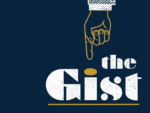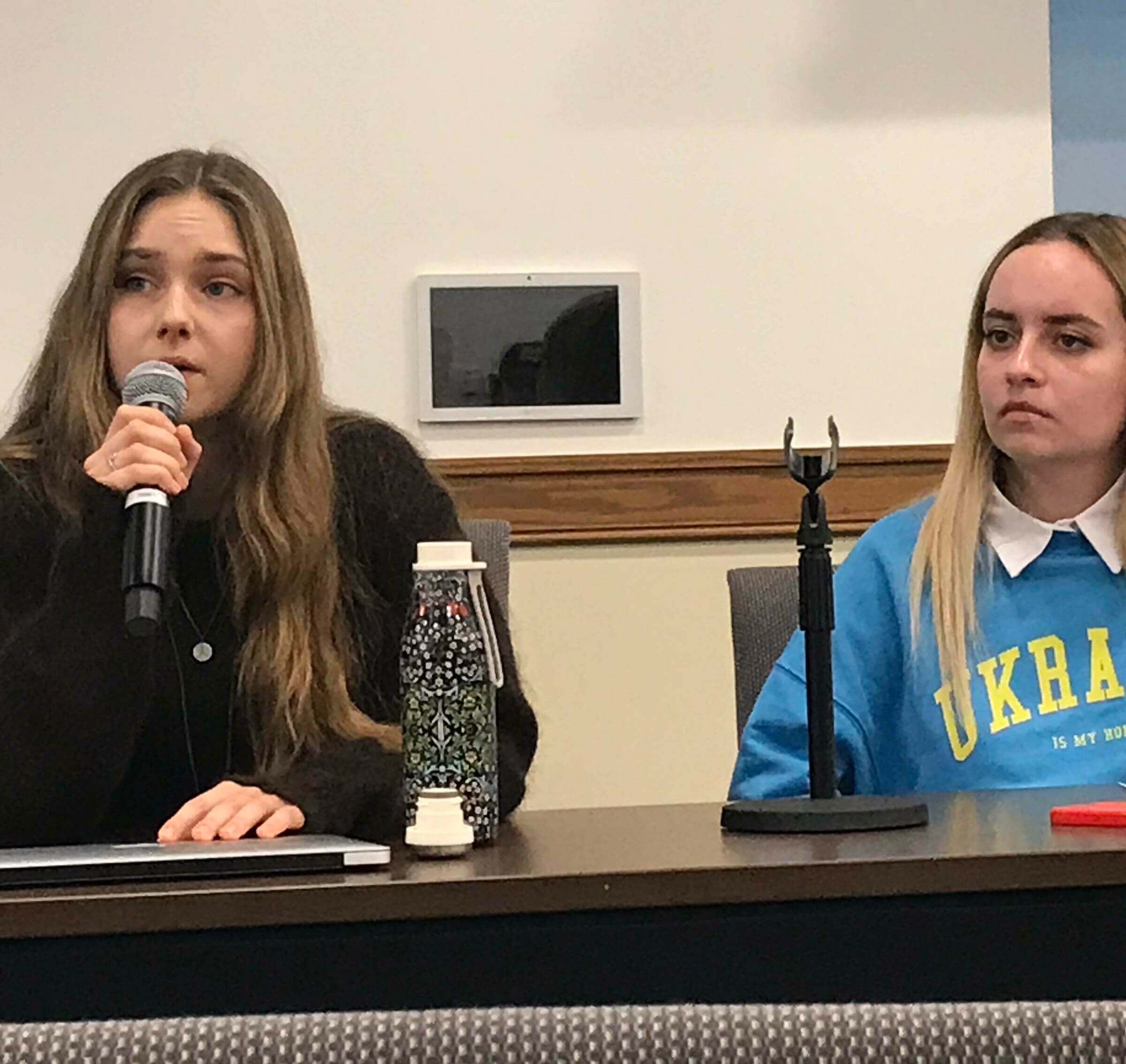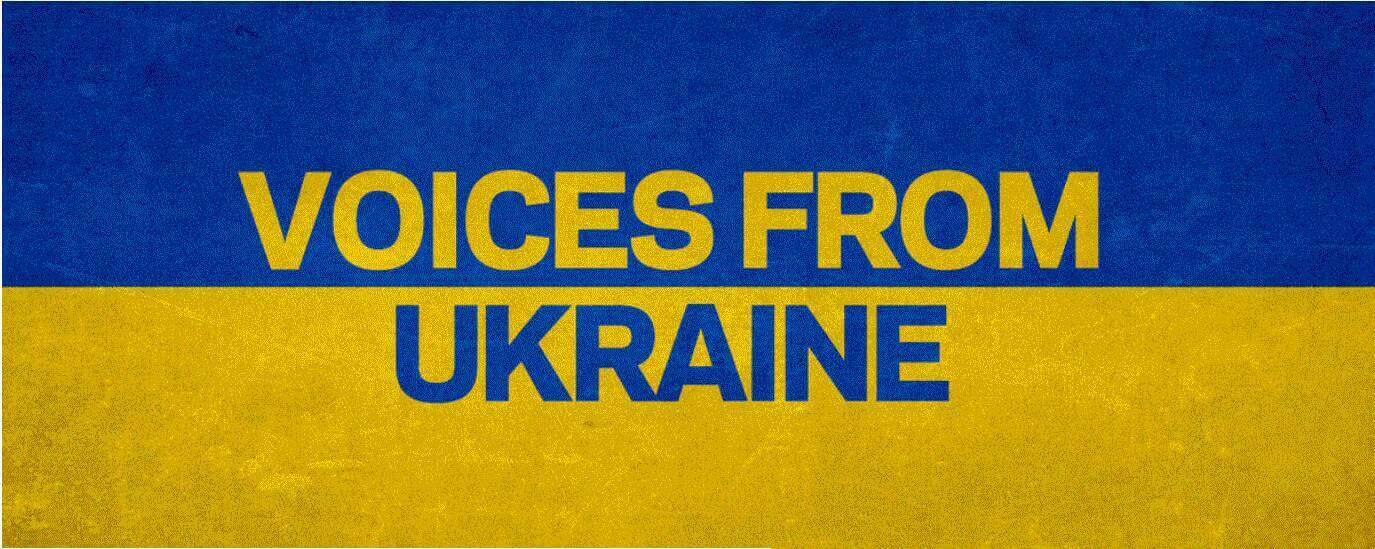
The world is watching what is happening in Ukraine: bombed cities, thousands killed and maimed, orphaned children, reports of torture by Russian troops and Russian President Vladimir Putin threating to use nuclear weapons.
Ukrainians have witnessed such scenes first hand. With the war against Russian invaders raging in their home country, 10 Ukrainian women are attending Notre Dame this semester as exchange students.
Their presence is part of an expansion of Notre Dame’s partnership with Ukrainian Catholic University in Lviv, a city near Ukraine’s western border.
During a September 22 panel discussion on campus, five UCU students spoke about the war and its impact on their lives and families. They described fears and challenges they have faced since February 24, when Russia invaded their country in a major escalation of the Russo-Ukrainian War that began in 2014.
The discussion was moderated by Clemens Sedmak, director of the Nanovic Institute for European Studies.
Selections from the panelists below:

Olena Tsyhankova, UCU undergraduate
After the invasion, she, her mother and younger brother walked 15 hours in the winter cold to reach the Polish border. They traveled on to Spain to live with her godmother. She said fear and anxiety have been constant feelings.
“Every Sunday there were demonstrations (in the Spanish village), where Ukrainians were trying to spread awareness about the war.” Many participants were Ukrainian women and children forced to flee from central and eastern Ukraine. “The traces of terror and pain and grief was reflected in their eyes and the women’s faces.”
“I do still feel guilty and as if I’m not doing enough, but I’m very happy that I was there for my family and that I’m here right now as well. Perhaps that was and still is my role in this event.”
Bohdana Yakobchuk, UCU undergraduate
When the war started, she was attending UCU and living in a campus dorm. Her parents wanted her to leave the country, but she refused. Her family didn’t want her to come home, because their town is close to the fighting and their house is across the street from a chemical factory that is a potential Russian target.
She went home two months later and the next day oil storage facilities a few miles away were bombed. “I learned that from a distance, you feel the vibrations of the explosions go through your body more than you can hear the sound itself. The terrifying bright oil fires were burning the whole night and the smoke could be seen for a couple more days.
“Me and my mom said we would not leave my dad behind. So he took us to a nearby range and taught us how to shoot.”
“Russian imperialism — which existed for centuries — wasn’t really recognized publicly until the start of the war with Ukraine. (This is) one of the first international conflicts of such scale that was televised and that exists on the internet so freely. And we have an abundance of information now that helps the world community realize that Russia is an imperialistic, colonialistic country.”
“Even though I love it here at Notre Dame, every day is filled with guilt and worry for the ones who are still in Ukraine. . . . Every time I get a surge of panic when I hear a siren, a fire truck or the sound of the plane, I am reminded that although I — unlike many others — can physically get out of war, the war always stays inside of me.”

Olha Droniak, UCU undergraduate
Schooling initially was suspended, but resumed at UCU two weeks after the war started. The university began offering mostly practical-oriented training that would help students to be useful during the war. Droniak and other students learned how to write articles for Western media to help those outside the country understand what was happening in Ukraine.
She was working as head of the media group in her dormitory, but reporting on daily life in the dorm stopped because it no longer seemed important. “But then some of the university staff called me and said that it would be great to collect videos with student stories of how and why they volunteered and how to fight the enemy, and then to share these videos abroad. . . . I’m very glad I did this because I was so inspired by the stories of my peers.”
“Now we are here at Notre Dame. In our exchange program, we study hard because we know that Ukraine will need professionals and educated people to rebuild.”
Kristina Bohdanova, UCU graduate student
Bohdanova is a medical doctor who is studying for a master’s degree in clinical psychology. She and others have established a charitable foundation that has 60 trained volunteers, including psychologists, social workers and UCU students. They train teachers, soldiers and others in stress management techniques and other methods for coping amid the trauma of war.
“I feel guilty that I’m not fighting, though I’m proud of our project. We are building resilience in Ukraine and taking action for our family on the psychological level, which is our fight.”
“People in Ukraine are extremely united. They’re helping each other in any possible way. Volunteering became the second part-time job for almost everyone. This unity will definitely help us to overcome all the fear and suffering of this war before and after our victory.”
Olha Tolmachova, UCU undergraduate
This year marked the second time she and her family have been displaced by Russian aggression. The first time was in 2014, when Russian troops invaded and took the eastern part of the country, including her hometown. Her family moved to Kyiv, Ukraine’s capital. This year, Kyiv and its surrounding region also have been under attack.
“The situation in Ukraine is the following: Thousands of killed peaceful civilians, damaged critical infrastructure, humanitarian crises in Ukraine cities and a refugee crisis in Europe make up a new reality. The threat of nuclear war is no longer an impossible danger.”
“My home city was under the full Russian authority. Now Russia is sending troops from my home city to Ukraine.”
The panel discussion was organized by the Notre Dame International Senior Fellows for Internationalization and the Ukrainian Society of Notre Dame, with support from the Klau Institute for Civil & Human Rights and the Nanovic Institute.
The Nanovic Institute is regularly updating its website of information and resources about the war in Ukraine.
Margaret Fosmoe is an associate editor of this magazine.